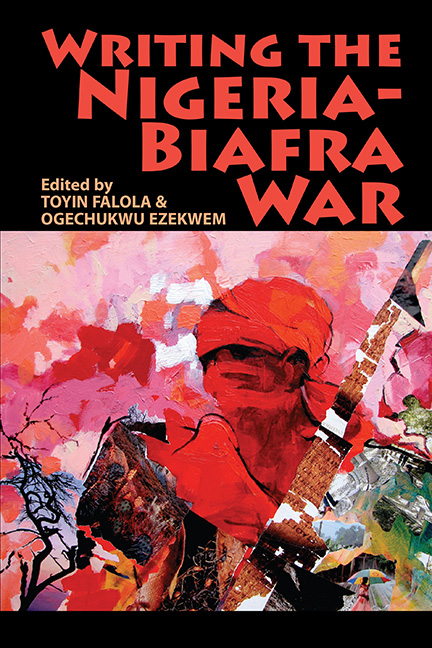Book contents
- Frontmatter
- Contents
- Notes on Contributors
- List of Abbreviations
- Timeline
- Map of Biafra 30 May 1967 – 1 May 1969
- 1 Scholarly Trends, Issues, and Themes: Introduction
- Part I On The History Of The Nigeria-Biafra War
- Part II Critical Debates On The Nigerian Crisis
- Part III The War In Fiction, Memoir, And Imagination
- Part IV Locating Gender In Nigeria-Biafra War Literature
- Select Bibliography
- Index
13 - Ethnic Minorities and the Biafran National Imaginary in Chukwuemeka Ike’s Sunset at Dawn and Chimamanda Ngozi Adichie’s Half of a Yellow Sun
Published online by Cambridge University Press: 17 June 2021
- Frontmatter
- Contents
- Notes on Contributors
- List of Abbreviations
- Timeline
- Map of Biafra 30 May 1967 – 1 May 1969
- 1 Scholarly Trends, Issues, and Themes: Introduction
- Part I On The History Of The Nigeria-Biafra War
- Part II Critical Debates On The Nigerian Crisis
- Part III The War In Fiction, Memoir, And Imagination
- Part IV Locating Gender In Nigeria-Biafra War Literature
- Select Bibliography
- Index
Summary
In 1969, American political scientist Rupert Emerson summarized one of the key debates shaping the course of the Nigeria-Biafra War:
If the whole former Eastern region, restyled Biafra by the Ibo [sic] secessionists, is the proper unit for self-determination, then the minorities may properly be subordinated to the majority and swept along in its wake. If, on the other hand, these minorities are assumed to constitute ‘peoples,’ are their claims to be heard less valid than those of the Ibos?
In this reflection, Emerson gestures towards the fact that the secession’s leaders cast the geopolitical territory initially under their control – the ‘whole former Eastern Region’ of Nigeria – as a cohesive ‘unit’ with the right to self-determination. Opponents of the separatist effort, on the other hand, not only denied the territory's people the right to self-determination but also contended that the secession was at its core an Igbo nationalist project. If the latter argument proved correct, then the region's minorities would necessarily be second-class citizens in the new nation.
Given the heatedness of this debate, amidst a host of political, economic, social, and other factors, minorities’ loyalties became ‘sharply divided’. Being 40 percent of the Biafran population and possessing well over half its land, eastern ethnic minorities such as the Ijaw, Efik, Ibibio, Ogoni, Annang, and Ikwerre would play a significant, potentially decisive, role in the conflict. With the battle for minorities’ support as a growing undercurrent of the Biafran War, official anti-secessionist rhetoric portrayed Biafra as an ethnoculturally grounded Igbo nation, from which ethnic minorities would ultimately be excluded, while official secessionist rhetoric depicted the fledgling nation as civic-territorial in its ideology and therefore ethnically inclusive in scope.
In various genres, from propaganda posters to scholarly works, stakeholders on both sides of the conflict frequently reiterated these depictions of Biafra. Novels would seem to provide an especially useful opportunity for Biafra's sympathizers to make their case, given their widely noted capacity to imagine a ‘unified and coherent’ civicterritorial nation and thereby obscure significant ethnic differences or tensions. Although some Biafran novels completel y sidestep the issue of minority inclusion within the secessionist nation, others assert Biafran nationalism as primarily territorial (and therefore ethnically inclusive), including Eddie Iroh's Toads of War and Cyprian Ekwensi’s Divided We Stand.
- Type
- Chapter
- Information
- Writing the Nigeria-Biafra War , pp. 265 - 283Publisher: Boydell & BrewerPrint publication year: 2016
- 1
- Cited by



